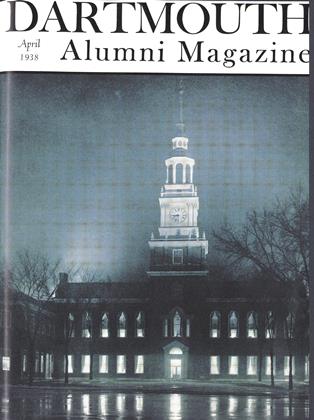RAFE ROISTER DOISTER, the fun loving rover of the sixteenth century, comes vividly to life in the Players' excellent production of what has been called the first genuine English comedy." So began Professor West's review of Ralph Roister Doister, presented in the Little Theatre on March 10, 11, and 13. Just who had the most fun, the cast or the audience, is a matter of question; but I rather think both had a very good time. Hal MacGilpen, who played the title role, is the only one who felt badly for, in the war between men and women which occurs in the fourth act, he lost the padding in the seat of his tights. Bruce Tompkins, as Mathew Merrygreeke, feeling that the audience should not be disappointed, laid into him anyway and each thwack rattled the chairs in the balcony. Mac's groans seemed to come from the very bottom of his heart. Good natured fun and song ran riot over the stage, as this story of the braggart lover unfolded, and once or twice spilled out into the house. Merrel Condit, Phil Huffman, and Herb Landsman formed an unusual trio as Annet Alyface, Madge Mumblecrust, and Tibet Talkapace, romping about on the stage in something of a cross between a jig and a square dance. The climax came with the fight and for a while it looked as though the Three Stooges had picked a quarrel with the Ritz Brothers.
Farce seemed inevitable in everything connected with the show and an incident occurred in the business office too good to be missed. The programs returned from the printer with the author as BulwerLytton, and Henry Williams as our Technicolor Director. We telegraphed them to print new ones, "Play by Nicholas Udall. Williams, Technical Director." We received another thousand programs with Bulwer-Lytton as the author and Nicholas Udall Williams as the Technical Director. So we mimeographed our own.
As this show goes on, and tryouts for Richelieu start, our season goes into the home stretch as low comedy gives way to high melodrama in the play about the great Cardinal, .which has been a favorite for exactly one hundred years.
 View Full Issue
View Full Issue
More From This Issue
-
 Article
ArticleIn Search of Snow Down Under
April 1938 By DAVID J. BRADLEY '38 -
 Article
ArticleThe Potentialities of Education
April 1938 By FREDERICK E. WAGNER '38 -
 Article
ArticleThe Undergraduate Chair
April 1938 By BEN AMES WILLIAMS JR. '38 -
 Class Notes
Class NotesClass of 1937
April 1938 By Donald C. McKinlay -
 Class Notes
Class NotesClass of 1910
April 1938 By Hap Hinman -
 Class Notes
Class NotesClass of 1934
April 1938 By Martin J. Dwyer Jr.
Article
-
 Article
ArticleMUSICAL CLUBS WESTERN TRIP
May 1921 -
 Article
ArticleA Familiar Financial Story
October 1940 -
 Article
ArticleDoctor Turned Investigator
JANUARY 1972 By BLISS KIRBY THORNE '38 -
 Article
ArticleMedical School
FEBRUARY 1963 By HARRY W. SAVAGE M' 27 -
 Article
ArticleHanover Browsing
May 1958 By HERBERT F. WEST '22 -
 Article
ArticleBookplate for 1926 Collection
JANUARY 1969 By PHILIP M. BENJAMIN '26

